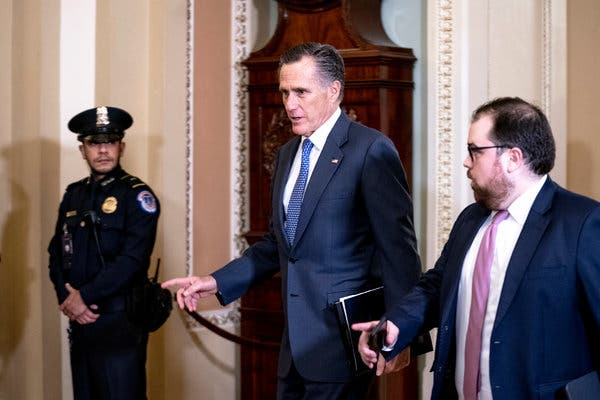Advertisement
Some conservatives want to recall him and others want to censure him. In the state he represents, though, many view speaking out against President Trump as an act to admire, not an apostasy.

SALT LAKE CITY — Phil Lyman wanted to do something swift and stern.
Within hours of Senator Mitt Romney’s vote to remove President Trump from office on Wednesday, Mr. Lyman, a freshman state representative from southern Utah who keeps an autographed “Make America Great Again” hat in a plexiglass case in his office, was at work drafting a resolution to censure the senator.
“I mean, I respect a guy that will stand up for his opinion, but it’s not without some repercussions,” Mr. Lyman said. “His action warrants an additional action on the part of the State Legislature.”
But just as swiftly came the pushback to Mr. Lyman from Utah’s Republican leadership.
“Censuring Senator Romney for voting his conscience is a tricky place to be,” the speaker of the state House, Brad Wilson, said in an interview.
The governor, Gary Herbert, told The Salt Lake Tribune, “I think that would be just a mistake to go down that road.”
The president of the State Senate, J. Stuart Adams, pleaded for reconciliation. “What I don’t want to do is move into the negative rhetoric I think is coming from Washington, D.C.,” he said at a news conference on Friday.
Barely eight years ago, Mr. Romney was the Republican nominee for president and putative leader of the party. Today, the way many Republicans accept and even encourage the attacks on him from Mr. Trump, who last week accused him of using “religion as a crutch” to justify the impeachment vote, vividly illustrates the turn the party has taken.
Utah Republicans never quite fell for Mr. Trump as hard as the rest of their party did. The state’s political sensibilities, heavily influenced by its Mormon culture, are more agree-to-disagree than salt-the-earth. The president’s coarse language, belittling nicknames and aversion to humility help explain why his approval ratings over all in Utah have been below 50 percent for most of the last three years.
And while they support Mr. Trump as their president — very few Republicans here say they would have voted to convict him as Mr. Romney did — they have refused to join the pile-on they see happening back east on Fox News sets and in social media feeds of the president’s followers, where their junior senator is being vilified as a “coward” and “Judas” who should be expelled from the Republican Party.
Not only does Mr. Lyman’s censure resolution appear to be dead on arrival, but the leader of the State Senate, Mr. Adams, also said last week that he would rather not vote on or debate any action related to Mr. Romney at all. He stressed that anything his chamber took up should be “positive” — a word he used repeatedly as he spoke to reporters at the State Capitol on Friday. He said he preferred something like a unanimously agreed-to statement that affirmed Mr. Trump’s strengths as president.
“It may feel right — you want to swing at someone — but I think it’s better off to do what’s right,” Mr. Adams said in an interview. Though he disagreed with how Mr. Romney voted, he added, “I have respect for what he did.”
Utah is one of the rare places where the few Romney-style Republicans who remain are relatively safe from a challenge from their right, where speaking out against the president can be an act to admire, not an apostasy.
With the most vitriolic condemnation of Mr. Romney coming from outside Utah, there has been something of a rallying effect around the senator.
“Not everyone hates Romney,” read the headline on an opinion article in The Tribune this weekend. “In spite of the loud voices who are busy calling him names, there are many of us out here who are cheering for him,” wrote the author, Holly Richardson, a former Republican legislator.
Salt Lake City’s other major paper, The Deseret News, which is owned by the Church of Jesus Christ of Latter-day Saints, published an editorial arguing against a censure of the senator and has run numerous other supportive pieces, including one declaring that his vote was “what a Christian conscience demands.”
Chris Karpowitz, a professor of political science at Brigham Young University, said the disputes between Mr. Romney and Mr. Trump illustrated two different visions about what it means to be a Republican.
“Sometimes they line up on policy,” Dr. Karpowitz added. “But in terms of style and rhetoric and commitment to what in previous years were thought of as core values, they couldn’t be more different.”
No state as heavily Republican has been so chilly to the president. Though active registered Republicans outnumber Democrats in Utah by more than three to one, Mr. Trump won only 45 percent of the vote in Utah in 2016. Hillary Clinton and Evan McMullin, a former intelligence officer who ran as a third-party candidate, split up the rest of the vote.
Last week, national conservative activists promoted a “Recall Romney” effort online and shared stories about a proposal circulating in the legislature that aimed to give voters the ability to recall their United States senators.
Aimee Winder Newton, a Republican candidate for governor, said that such a move would have worrisome repercussions. “I get that many state legislators are disappointed,” she wrote on Twitter. “But creating a culture of censuring could come back their way.”
In reality, the recall bill was drafted months ago and has little support in Salt Lake City. Its sponsor has said that it has nothing to do with Mr. Romney or impeachment, and is instead meant to bolster the rights of Utahans to hold all senators accountable.
Lawmakers and constitutional experts said the measure would probably not survive a court challenge anyway.
“My strong impression,” said Edward Foley, the director of election law at Ohio State University, “is that this kind of recall would be clearly unconstitutional. After all, the Constitution itself specifies six-year terms for senators, and has no mechanism — other than expulsion by the Senate itself — for a state to end a U.S. senator’s service before the six years are up.”
Mr. Romney is by no means infallible among Utahans. And Mr. Trump is more popular here now than he was four years ago, thanks to a strong economy and his dedication to filling the courts with conservative judges.
Though Mr. Romney is often associated with Utah because of his role in leading Salt Lake City’s effort to prepare for the 2002 Winter Olympics, he had spent most of his life living elsewhere before deciding to run for Senate in 2018 — a liability in a state where many families can trace their lineage back to the mid-19th century, when Mormons arrived in the Salt Lake Valley. His campaign ran into trouble early on with activist Republicans when he lost to a little-known legislator at the state convention, which forced a primary he later won. In the general election he won with almost 63 percent of the vote statewide.
But the objections of grass-roots conservatives who have outsize influence in state conventions had little to do with Mr. Romney’s history of feuding with Mr. Trump. Instead, they bristled at an attempt by Mr. Romney to gather enough signatures to circumvent the convention.
Mr. Romney has worked diligently to cultivate relationships with Republicans in Salt Lake City. After he left Washington the day of his vote on the president, one of his first stops was at the State Capitol to meet Republican lawmakers to explain himself. He spoke at two different meetings, one with House members and another with the Senate leadership.
He delivered a version of the speech he gave on the Senate floor last Wednesday in which he said his oath to God and faith guided him toward “the most difficult decision I have ever faced.” Some legislators questioned his motives, asking why they should believe that he wasn’t just trying to get even with the president. Others worried about Utah suddenly finding itself in the president’s cross hairs and whether it would damage its relationship with the federal government, which controls about two-thirds of the state’s land.
“For a lot of us,” said Speaker Wilson, “the question was: ‘What does this decision mean for your effectiveness as our senator?’”
The meeting was intended primarily for legislative leaders, but Mr. Lyman, the author of the censure resolution, was invited as well. In an interview, he said that Mr. Romney had earned his respect for showing up, but not for his vote.
He had only a few seconds to address Mr. Romney as the senator was leaving and used the opportunity to defend Mr. Trump for reducing the size of protected federal land in Utah so it could be used for commercial purposes.
“There’s a lot of talk in politics,” Mr. Lyman recalled telling the senator. “And President Trump actually came out here and did something.”
But even Mr. Lyman’s disappointment with Mr. Romney has its limits. Next to the bookcase in his office at the Capitol where he has his autographed MAGA hat stands another political memento he is proud of: a life-size cutout of Mr. Romney.



